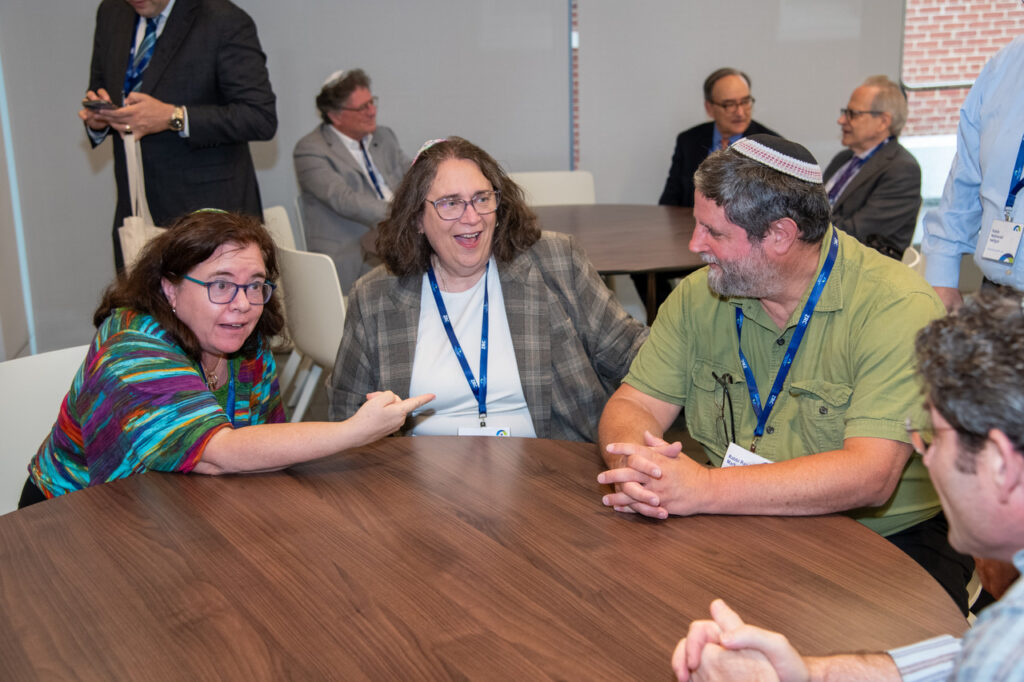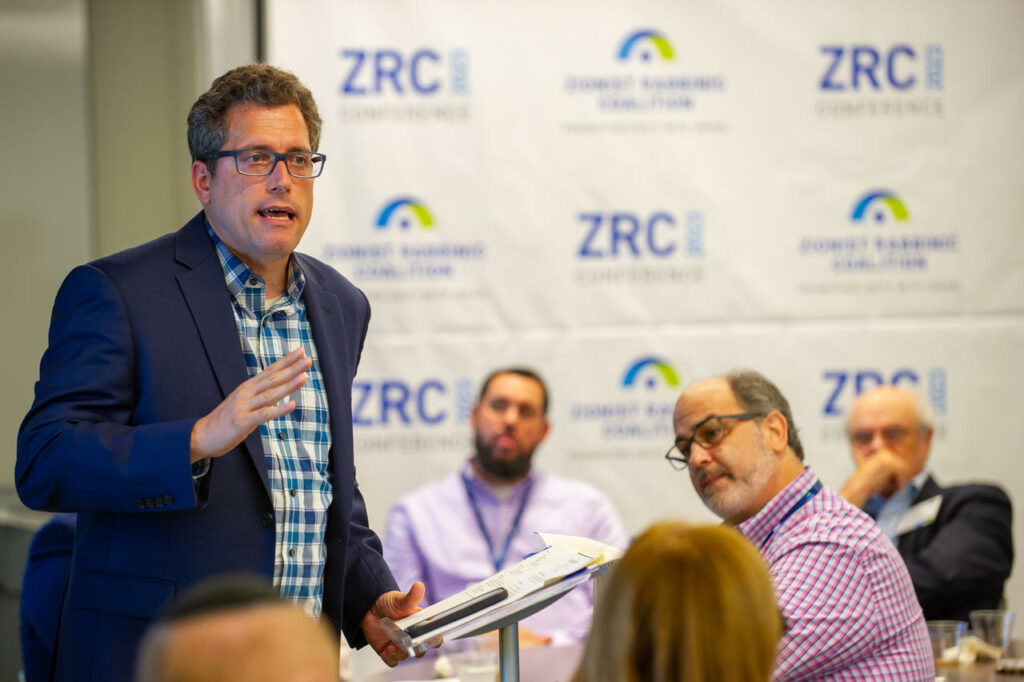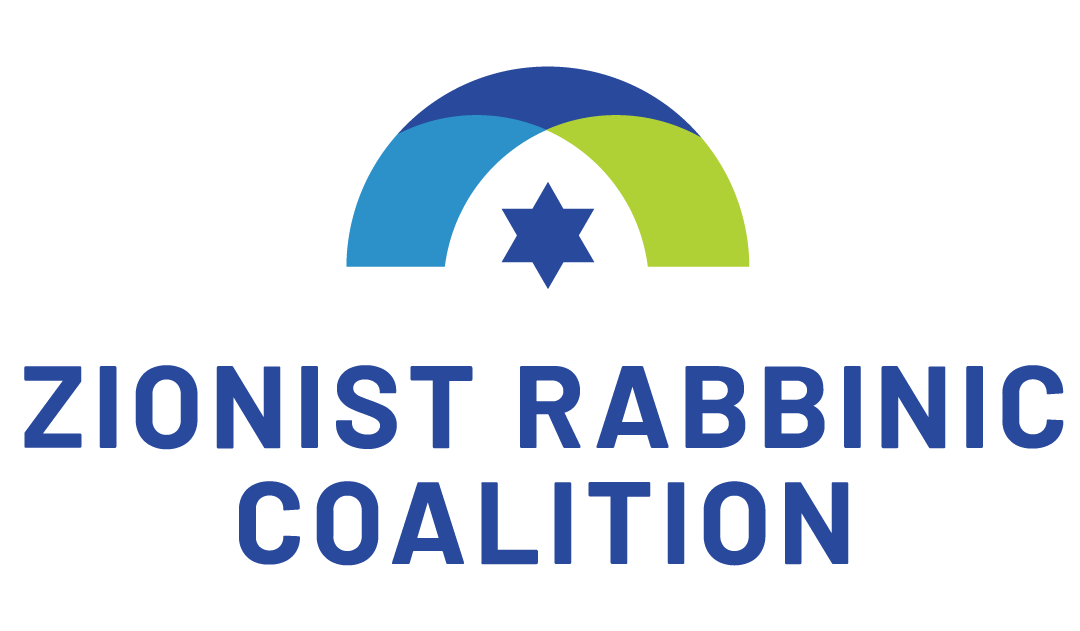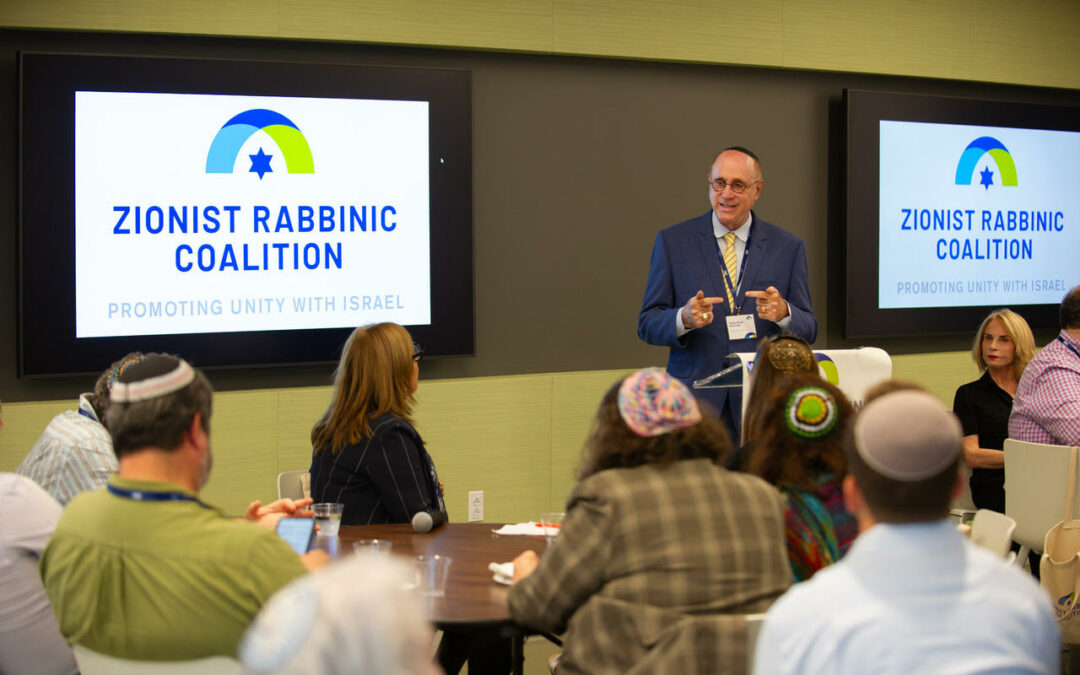Opening Session – ZRC Conference 2023 – Advocating for Israel: More Challenging And More Important Than Ever
In talks around the country I often get a similar reaction when I speak about the founding, existence, and need for there to be a Zionist Rabbinic Coalition.
The most common comment I get is, “I thought all rabbis are Zionists.”
Some understand and recognize the reality and the problem. They lament,
“How unfortunate and what a sad commentary on the current state of affairs that there is a need for a Zionist Rabbinic Coalition.”
The landscape of the American Jewish community and of the American rabbinate is changing, and the changes are coming rapidly.
Who would have ever imagined during any of Israel’s previous wars that would-be rabbis would have the chutzpah to publicly circulate a letter condemning Israel for taking actions to defend its citizens!?
Too many of our colleagues view promoting various ethical or social justice issues – all of which are admirable and praiseworthy, as the primary focus of their rabbinate, they minimize our responsibility to promote Jewish peoplehood.

While issues of social justice are important, too many have forgotten that before Hillel said “ucsheani lee, mah anee: If I am only for myself, what am I”, he first said, “Im ein ani lee, mee lee: If I am not for myself, who will be for me?”
Just as it takes two wings for a plane or bird to fly, for us Jews to reach the true heights of our God-given potential and mandate, we must pursue both aspects of our calling – particularism and universalism, and not exclude either aspect of our mission.
To be a Jewish leader, one must love the Jewish people and in the tradition of Moshe Rabbenu and the prophets, be willing to be a strong defender of our people – even when not happy with aspects of their behavior.
And this is not always easy.
With all that is going on today in Israel, we face a difficult, daunting and challenging task. Israel is divided and polarized with an intensity that is surprising. As Michael Oren told me when I was with him last Shabbat in Israel, “We are witnessing the Americanization of Israeli politics.”
People may not know how to respond to the charges that Israel is becoming a dictatorship and that it is no longer a democracy – and assume because of the sheer magnitude and force of the charges and reporting about them that they are true. And by the way, these accusations are coming from those who believe in Israel’s right to exist!
This is why the current situation calls out for rabbis to lead. Rabbis must rise to the occasion and offer leadership and show the way forward.

As is our pattern, we look for answers, guidance and precedence in Jewish history and in our sacred sources.
At a time such as this the Talmud’s presentation of Tisha B’Av and the famous observation by the rabbis that Jerusalem was destroyed, the Temple and Jewish independence and autonomy were all lost and sacrificed because of the sin of sinat hinam – senseless or baseless seems especially relevant and pertinent.
Its condemnation of unjustified hatred which leads to internal internecine discord and division is meant to be a cautionary tale of the dangers that can come from internal strife. But there is another layer to the story, one which we do not always pay attention to, which is also relevant today.
We all know the story – of Kamza and Bar Kamza, of the invitation going to the wrong guy, and the disastrous consequences caused by the personal shame and embarrassment and the sharp condemnation of the rabbis, whose indifference to the humiliation of the guest is harshly criticized.
Many often see in the story frightening parallels to our own time. But in reflecting on the story this year, I saw a detail I had not previously thought much about.
What is it that led the Romans to decide to conquer and destroy Jerusalem?
It was prompted by the wronged individual taking his dispute to Rome. His grievance and hurt was so great and the rift so deep between him and his fellow Jews he felt he had no alternative other than to turn to an outside interlocutor.
Overcome by his personal embarrassment, Bar Kamtza is quoted in the Talmud as saying, “Since the Rabbis were sitting there and did not stop him, this shows that they agreed with him. I will go and inform against them to the government.”
And I thought perhaps the cautionary message for us to consider is the danger of what happens when Jews turn to outside authorities to intervene in our affairs. Historically, things usually did not turn out too well for us.
And that is why – regardless of how one feels about the current issue, and I am sure that we have in our group rabbis who favor and rabbis who oppose the proposals – the most important position we can take is to encourage dialogue, consensus and compromise, for the parties involved to find a solution to the current quagmire.
Just the other night I was speaking with friends who are life-long Zionists, supporters of Israel, who visit frequently, who said that in light of all that they are hearing about what is going on — they are not so sure they want to visit Israel – proving what I have always maintained – publicly promulgating negativity and denigration of Israel has adverse consequences.
The Zionist Rabbinic Coalition offers a unique perspective and voice. Our support for Israel is not predicated upon any particular government, or the adoption of any particular policy, but emphasizes Jewish unity and transcends the political issue de jure.
Motivated by ahavat Yisrael, we take the long view, the bigger picture and recognize the harm that is done not just to Israel, but to one’s connection to Judaism, the Jewish people and one’s own Jewish identity when all people hear from their rabbis is criticism of the State of Israel. Rabbis’ critiques and criticisms of Israel should not be louder or stronger than their expressions of love.
Taken to its extreme as some have, to be a non-Zionist or an anti-Zionist is to deny the very concept of Jewish peoplehood and to contend that Judaism is just a religion, a concept we reject.
At this conference, we will hear from a wide range of individuals representing different perspectives and areas of expertise. Our goal is to become better informed and to understand the challenges facing us and Israel today, to arm and fortify us with tools and information, for as our theme for the conference states: “Advocating for Israel: More Challenging and More Important Than Ever.”
We will study texts and prepare for the High Holidays. We have set aside time for rabbis to interact with each other – to speak and learn from each other’s experiences and collective wisdom. Through it all, we will strengthen our movement and each other.
One of the unique aspects of the Zionist Rabbinic Coalition is the access we have:
Our webinars present rabbis with a broad range of journalists, think tanks, politicians, analysts and others. Most recent one – Haviv Gur was especially enlightening.
In June we traveled as guests of the United Arab Eemirates and Bahrain on a mission to celebrate the Abraham Accords. We will hear more about the mission tomorrow night. But let me just give you a quick rundown of the lineup of who we met:
In the UAE we met a member of the Royal family, the minister of Tolerance; the equivalent of the Chairman of the Foreign Relations Committee, we visited the Abraham Family House, and visited with the curator of the only Holocaust Museum outside of Israel in the Middle East.
We had dinner in Bahrain with Israel’s Ambassador to Bahrain, a Jewish member of the Parliament and met a couple of sheikhs in both places.
In Israel our lineup included:
Natan Sharansky, Tal Becker, Rav Stav, Gil Troy, Bahrain’s ambassador to Israel, the Speaker of the Knesset, Mikki Levy, the former Speaker of the Knesset who is a leader in Yesh Atid, Elazar Stern, the Foreign Minister, Ellie Cohen, Minister of Diaspora Affairs, Amichai Chikli, Minister of Jewish Heritage Amichai Eliyahu (who was criticized for meeting with us, but who said – we will not agree on everything, but I want to hear from you – as brothers, and who took the extraordinary act of releasing a photo of his meeting with us and a press release), Ron Dermer who met with us for an hour, and the Prime Minister who also met with us for an hour in the Cabinet Room.
All of that and more, in 2 ½ days.
So we take seriously the notion of dialogue – of it being a two-way street, which means not just telling Israelis what we think they need to do, but listening to them as well, as we seek to build bridges and close the gap between the Diaspora and Israel.
And most of all, we offer support for each other. We all know the rabbinate can be a lonely profession. And so we come together to offer support and hizuk to each other.
Thank you for coming. Thank each of you for all you do on behalf of the Jewish people.
Rabbi Stuart Weinblatt,
Chairman, Zionist Rabbinic Coalition
sweinblatt@zionistrabbis.org





